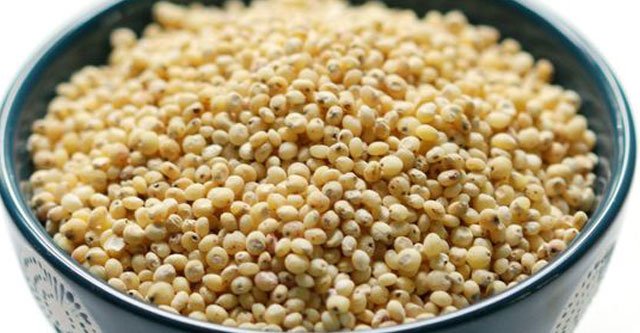Last Updated on March 18, 2021 by Dr Sharon Baisil MD
With the diagnosis of blood sugar issues in the body, all types of food become a questionable deal to the individual. Pulses, every day cereals, vegetables, fruits, etc., all stand as confusing food items. As a diabetic, you may often wonder whether a particular food is healthy or not for the body.
Today, we will break down one such food item as per the diabetic confusion. We are dealing with a cereal today; it is the Sorghum. This is one of the oldest and now a rather uncommon cereal in the diet.
It is used in a variety of ways and a variety of different cuisines. It is also called the Great millet.
Are you wondering …?
- Is sorghum good for diabetes?
- What is its glycemic index?
- What are its nutritional components?
- What are the health benefits of eating sorghum?
Let us see what this cereal is all about and how it can influence the body. We will discuss its diabetic side to ensure that you are well equipped with all that you need to know about diabetes.
So, let us get started with the basic discussion about today’s topic. Here we go!
What is Sorghum?

The sorghum is a cereal that originated from a grass family of plant species in Africa. It is known by several different names such as – Great millet, Durra, Indian millet, Orshallu, Guinea corn, milo, etc.
It is obtained from the cereal grain grass family – Poaceae. It is one of the major food crops in its land of origin. This cereal is used by men for consumption and also as fodder for cattle. It also has other uses, except for consumption.
It is commonly known as jowar in India. It is regarded as a coarse grain cereal that is not very commonly used in today’s time.
This cereal’s staple use is to make a type of Indian bread that is more nutritious and safe on the body.
It is a crop grown in hot and dry regions with less water-retaining soils. These crops can survive and grow in such climates. Sorghum is harvested from its plant as seeds smaller than wheat grains. They are small, round, usually cream, white, or yellow.
It is of a lower feed quality as compared to corn grain. Sorghum is a starch-rich cereal with more carbohydrates in it. It also has notable quantities of fats, proteins, and other vitamins and minerals.
It is commonly used to make baked goods and to prepare healthy porridges. Sorghum is also used in making oils. It is one of the healthy and safe grain options for all. It is also gluten-free, a quality it is known for greatly.
It is recommended to patients of certain diseases as it is also a whole grain. Whole grains are better than refined and processed grains.
But is it good for anyone who has diabetes too? Let us have a look.
Is Sorghum good for diabetes?

This is a question a lot of you might have in mind. Well, to clear it – yes, indeed, sorghum is a great supplement to add to your diabetes diets. It is safe and okay for diabetics to have this cereal without any chances of experiencing extreme hikes in the blood sugar levels.
Despite the high starch level in this cereal, it is great on the body due to the various other factors that we will discuss.
As we know, Sorghum is a cereal obtained from plants. It is high in phytonutrients that are very necessary for the body.
Moreover, the presence of phytochemicals in food has been shown to lower glucose levels in the body. Hence, the consumption of sorghum has such benefits on the body.
Experiments and studies have found that eating sorghum can lower the fasting blood sugar levels in the body. It has been observed that sorghum has a hypoglycemic effect on health.
The phytochemical – Caffeic acid is a major nutrient in fermented sorghum. This has also been used in the treatment of diabetic conditions.
Thus, sorghum is a good way to keep a check and reduce blood sugar levels. Therefore, including sorghum as a cereal in place of other starchy and high-sugar cereals can help manage and control diabetes.
In addition to this, sorghum is also a whole grain, which is always a good option for anyone diagnosed with diabetes. Whole grains are higher in fiber, and so is Sorghum.
The fiber in diabetic health can reduce blood sugar spikes and control metabolic functions as well. It helps in reducing the chances of extreme rises in blood glucose levels.
Fermented sorghum grains are very high in antioxidants, anti-bacterial, and anti-inflammatory elements. These are important nutrients for the health and especially for diabetic patients.
On top of that, the bioactive compounds in sorghum help in better absorption of the other nutrients administered to the body.
We will discuss the other uses, nutrients, and benefits of Sorghum as we move forward. But before that, let us have a look at what the glycemic index of Sorghum is.
What is the Glycemic Index of Sorghum?

The glycemic index is an excellent way to judge foods based on their nutritional composition. This measure considers the number of carbohydrates found in the food and its eventual impact on the blood sugar levels of the body.
The glycemic index of foods is measured on a scale from 0 to 100. After ranking the food based on its carbohydrate content, it is placed in three glycemic index categories.
The following are the glycemic index categories:
| Sl. No. | Glycemic Index categories | Glycemic Index ranges |
| 1. | Low Glycemic Index (safe for diabetics) | 0 to 55 |
| 2. | Medium Glycemic Index (safe when taken in controlled quantities) | 55 to 69 |
| 3. | High Glycemic Index (unsafe for diabetics) | From 70 and above |
The above table represents the ranges of safe, moderately safe, and unsafe glycemic ranks. These classifications make it easier to determine whether a particular food fits right in your diabetic meal plan or not.
You might be wondering about what the glycemic index of sorghum is? Well, the glycemic index of sorghum falls within 62. This is a medium range.
It is to be understood that the various uses of sorghum lead to a varying glycemic index level. Sorghum flour and other products also fall under a low to medium GI range.
Although it may appear high, the glycemic index of Sorghum is compensated by the presence of fiber in this cereal. The dietary fiber also makes up a good portion of Sorghum.
It is a safe food choice to add to your diabetic diets, and it will not lead to any harmful fluctuations.
What is the nutritional composition of Sorghum?

We had a look at the goodness of sorghum for diabetes. We also learned about what the glycemic index of sorghum is and how it will affect the body. But now, we will move on to learning about the nutrients that are found in Sorghum.
The table that is given below shows the nutrients and their quantities found in sorghum:
| Sl. No. | Nutrients found in 100 g of sorghum | Amount available |
| 1. | Calories | 329 |
| 2. | Total fat – Saturated fat | 3.5 G – 0.6 g |
| 3. | Total carbohydrate – Dietary fiber – Sugar | 72 g – 6.7 g – 2.5 g |
| 4. | Protein | 11 g |
| 5. | Sodium | 2 mg |
| 6. | Calcium | 13 mg |
| 7. | Iron | 3.36 mg |
| 8. | Potassium | 363 mg |
| 9. | Thiamine | 0.38 mg |
| 10. | Riboflavin | 0.15 mg |
| 11. | Niacin | 4.3 mg |
Now, you can find out what the variety of vitamins, minerals, and other nutrients you can obtain from sorghum consumption are.
Let us move further to see what the advantages of having Sorghum are.
What are the Benefits of eating Sorghum?
Given below is a list of the excellent uses and benefits of sorghum on health. Its effective health aids will compel you to add them to your daily diets.
- First and foremost, sorghum is among the best choices for many as it is gluten-free. People will develop gluten allergies can also include sorghum, without any worries about their health.
- It is rich in fiber, which helps in maintaining the metabolism and good digestion in the body. It also avoids issues such as constipation, gastric inflammation, intestinal disorders, etc.
- It is also a great source of protein. It is another essential macronutrient that assists in the development of the body and the regeneration of cells.
- The presence of calcium and magnesium in sorghum help to maintain bone health and strengthen the bones. These minerals also help with increasing the absorption capacity of other nutrients.
- It is a resource of several minerals and vitamins. It enriches the body with nutrients like – vitamin B, zinc, copper, etc. They have very beneficial effects on the protection and maintenance of the body.
- The fiber present in it also helps in reducing the levels of bad cholesterol in the body. This contributes to keeping the heart healthy and free from risks of diseases.
- Sorghum is a great cereal that aids in the process of weight loss. Unlike other starch-rich cereals, it has more helpful compounds that encourage weight loss.
- Iron and copper in sorghum help to improve blood circulation in the body leading to overall better functioning.
References
- https://www.frontiersin.org/articles/10.3389/fnut.2018.00016/full#:~:text=Sorghum%20is%20rich%20in%20phytochemicals,DM%20(9%2C%2010).
- https://www.nutritionvalue.org/Sorghum_grain_nutritional_value.html
- https://www.fatsecret.com.au/calories-nutrition/generic/sorghum?portionid=62470&portionamount=100.000
- https://www.sciencedirect.com/science/article/abs/pii/0271531796001844
- https://www.sciencedirect.com/science/article/abs/pii/S0963996910004266
- https://onlinelibrary.wiley.com/doi/abs/10.1002/ptr.2431
- https://journals.plos.org/plosone/article?id=10.1371/journal.pone.0240873
- https://www.tandfonline.com/doi/abs/10.1080/87559129.2015.1022832
- https://clinphytoscience.springeropen.com/articles/10.1186/s40816-021-00259-3
- https://www.tandfonline.com/doi/abs/10.1080/10408398.2014.887057
- https://link.springer.com/article/10.1186/1743-7075-9-106
- https://pubs.rsc.org/en/content/articlehtml/2014/fo/c3fo60432b
- https://www.sciencedirect.com/science/article/abs/pii/S0308814610010071
- https://onlinelibrary.wiley.com/doi/full/10.1111/1541-4337.12506
- https://www.mdpi.com/2304-8158/9/9/1301










Thank you Dr.Sharon for your excellent analysis on the benefits of sorghum for health, and particularly for diabetes.
Thank you Russom for the wonderful feedback. I am really happy that the post was useful for you
It’s quite enlightening…
Thank you